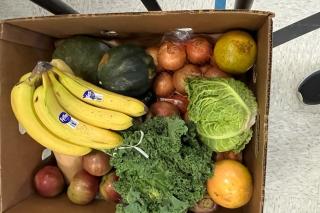Six months into the pandemic, J.Q. Stewart ’22MSW received a call from his friend and mentor, Will Delaney ’19MSW. Delaney wanted to know if Stewart would be interested in delivering groceries to veterans for Rose’s Bounty, a food pantry in West Roxbury, Massachusetts. Stewart, a former Navy submariner, said yes. Soon he was volunteering every week.
“At a time when we were all disconnected, I found fellowship with these veterans who were just great company,” explains Stewart. “Rose’s Bounty also put the reality of food insecurity right in front of me. It’s been an amazing, humbling experience.”
Currently, up to six student veterans at the Simmons School of Social Work participate in the effort, which was started at Simmons three years ago by Delaney, a former Marine and MSW graduate who is now a social worker with the U.S. Department of Veteran Affairs. Associate Professor Abbie Frost, PhD, faculty advisor of the Student Veterans of America chapter at Simmons, links the work to the MSW program’s commitment to military service members, in the classroom and beyond. “Our students are passing the torch,” she says, working hard “to create a community of veterans respectfully providing support to other veterans.”
Each Friday, Rose’s Bounty volunteers pack and deliver donated groceries out of the nonprofit’s home at the Stratford Street United Church. The recipients range from Afghanistan War veterans in their 20s to Vietnam War veterans in their 70s, says Frost. About 25 veterans in and around Boston typically receive packages, she adds, but on one Friday each month, the number increases to 100 veterans receiving packages.
Yet, as Stewart points out, “a drop-off is never just a drop-off.” He reports feeling a deep bond with his fellow veterans, often spending time talking in kitchens and at front doors. Currently interning at the Manchester (NH) Veterans Administration, Stewart says the interactions have also strengthened his social work skills. He often follows up with Rose’s Bounty’s VA coordinators—several of whom are Simmons Social Work graduates—to advocate for additional services related to housing stability, substance use recovery, or home safety. In January, Stewart and Frost presented the paper “Supporting Veterans’ Academic Successes, Well-being and Positive Mental Health: Employing a Strengths-based Approach” at the National Student Veterans of America national conference in Orlando.
Another Simmons Social Work student veteran, Eli Lorenzo ’23MSW, is working to identify “invisible veterans”—former military members who have disconnected from VA services but are in need of assistance with food and housing. “Many veterans don’t seek help for a variety of reasons,” he says. “Some are so deep into their problems and their traumas, they have basically given up.”
An Army veteran who served in Afghanistan, Lorenzo has found six invisible veterans through contacts in veteran’s organizations and his Roxbury neighborhood. In addition to delivering them food from Rose’s Bounty, he has come to understand their reasons for disengagement. In the spring, Lorenzo and Frost plan to conduct a needs assessment to learn if other support systems or resources may be helpful.
All of this work, agree Stewart and Lorenzo, reflects the loyal, tight-knit nature of the military community. “We’re a family,” says Lorenzo. “We take care of our own.”
Alumnae/i Feature
Simmons Social Work Student Veterans Help their Community Fight Food Insecurity

